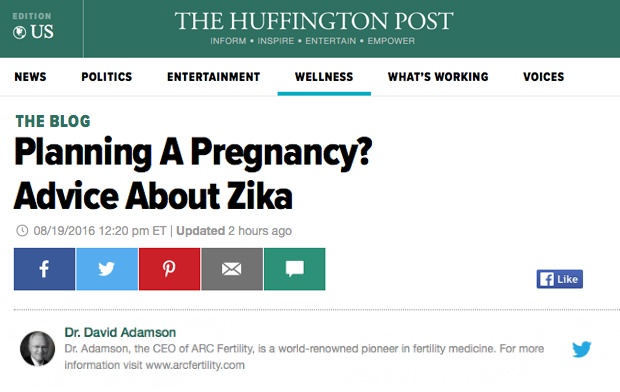Couples undergoing infertility treatment usually have lots of questions and may worry about their chances of getting pregnant and having a healthy baby. Now, some are wondering if they need to ask another question: should I worry about Zika? The answer today is probably not — based on what we currently know — but being well-informed is always a good idea.
While we know the Zika virus is spread primarily through daytime active mosquitoes (and nearly all of the more than 400 U.S. cases are from international travel), the symptoms can be mild or not present which makes it difficult to know of you have it. It can also be transmitted by a man to a woman through sex, through a blood transfusion and rarely from a woman to a man through sex.
Still, until recently, media coverage of the Zika virus primarily focused on the risks to already pregnant women for miscarriage and brain damage to the developing fetus. Now, attention has turned to those seeking to become pregnant, especially in Miami where one neighborhood is the only place in the continental U.S. with known active transmission from mosquitoes. Not surprisingly, Miami-based infertility specialists report being flooded with questions from patients. Unfortunately, at this time, there are still many questions for which we don’t have definitive answers.
To assist infertility specialists and their patients across the country, the American Society for Reproductive Medicine (ASRM) issued an April report [Note: Since the publication of this article ASRM updated their guidelines – the link here is updated to the September 2016 pdf.] http://www.reproductivefacts.org/globalassets/asrm/asrm-content/news-and-publications/practice-guidelines/for-non-members/asrm_zikaguidance_09-13-16.pdf with recommendations for care guidelines and patient counsel. Based largely on information from the Centers for Disease Control (CDC) and the Food and Drug Administration (FDA) — the two U.S. agencies closely tracking Zika — the report covers patients planning a pregnancy, testing issues and use of gametes in patients undergoing fertility treatments.
Among the recommendations:
- Women who have Zika disease symptoms should wait at least 8 weeks after symptoms appear, and men should wait 6 months before attempting reproduction.
- Men and women with possible exposure to, but not showing symptoms of Zika should also wait 8 weeks.
- These same timelines should be used for sexually intimate couples using their own gametes in fertility treatments.
- For donated reproductive tissue, FDA guidance should be followed: a potential donor is ineligible for 6 months following being diagnosed with, or having had a high probability of exposure to, the virus.
- Testing for Zika is complicated, not universally available and routine serologic testing is not currently recommended or even available.
- Physicians should counsel and educate their patients on Zika and update their informed consent procedures to reflect that counseling.
For fertility specialists and other healthcare professionals, an ongoing challenge is that what we know about Zika is changing so rapidly that ASRM is currently working on new guidelines and advising that guidance published in April may not be accurate for counseling and treatment as the weeks and months pass.
The expected new guidelines will take into account new information about how the virus can be transmitted through sexual contact from women to men, according to Dr. James Segars, a member of the ASRM Zika Virus Guidance Task Force and professor of obstetrics and gynecology at Johns Hopkins University. “Basically, at this point there’s very little risk right now of being affected by a mosquito.”
Fertility specialists in Miami need better guidance and research now, citing a spike in patient contact — for one clinic, more than double the usual phone calls. “Concerned couples want to discuss their treatment plan and ask should I wait to get pregnant or freeze my eggs?” http://abcnews.go.com/story?id=41213999 according to Dr. Joelle Taylor, of the Fertility and IVF Center of Miami, an ARC Fertility https://www.arcfertility.com member clinic.
The CDC advises people who want to become pregnant or are in the middle of infertility treatment and live in a transmission area to talk to their health care provider — even if they don’t have symptoms. But specialists admit counseling in the preconception stage is a challenge given limited data. The first line of defense against Zika is to avoid, if possible, traveling to areas in which the virus has been found. If travel is unavoidable or a person lives in such an area, then it is important to try to avoid mosquito bites by staying away from areas with mosquitoes, covering the skin as much as possible, using mosquito repellent and ensuring mosquito screens and other barriers are used whenever possible.
Following waiting period guidelines has real implications for Miami patients currently undergoing fertility treatments as waiting weeks or months may result in loss of valuable time and money. “Patients currently in cycle have questions on whether the quality of egg or sperm can be compromised, we don’t have those answers,” Taylor said. “No cases to date show impact on egg quality or sperm quality.”
With so many unanswered questions about the virus and its impact, ASRM just announced a new research program aimed at understanding the virus to better counsel and treat patients. Support and grant funding will come from ASRM plus the American Board of Obstetrics and Gynecology (ABOG), the American College of Obstetricians and Gynecologists (ACOG), and the Society for Reproductive Endocrinology and Infertility (SREI).
“Like many decisions about pregnancy, fertility decisions are complex, and Zika is one more factor to consider,” says Dr. Denise J. Jamieson, chief of the Women’s Health and Fertility Branch at the CDC and co-lead of the Pregnancy and Birth Defects Task Force for the Zika response, in an interview with ABC News. “We literally are evaluating information every day. In Miami, Dr. Taylor reports she will not advise her patients to wait an extended period of time.
Stay tuned.


